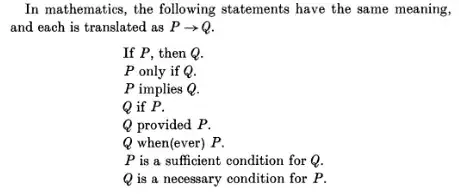Every lecture that I watched on mathematical logic and my textbook say that
$P \Rightarrow Q$ has the same meaning as $\text{"If $P$ then $Q$"}$ which has the same meaning as $\text{$Q$ only if $P$}$.
How does " $\text{if $P$ then $Q$}$ " have the same meaning as " $\text{$Q$ only if $P$}$ ?
i think that is not true. For instance, let $P = \text{a human $x$ killed human $y$}$
and $Q = \text{the human $x$ will be arrested}$.
Then $P \Rightarrow Q$ means $(\text{a human $x$ killed human $y$}) \Rightarrow (\text{the human $x$ will be arrested})$
which means
$$\text{if a human $x$ killed human $y$, then the human $x$ will be arrested} \quad (1)$$
but if we say ,
$$\text{a human $x$ will be arrested, only if the human $x$ killed human $y$} \quad (2)$$
then the meaning of (1) differs from (2). Statement (2) says that the human $x$ will be arrested in only one case which is killing $y$.
